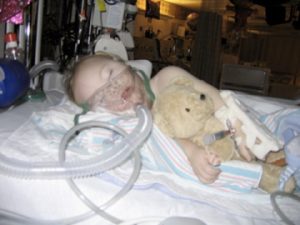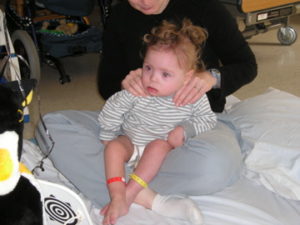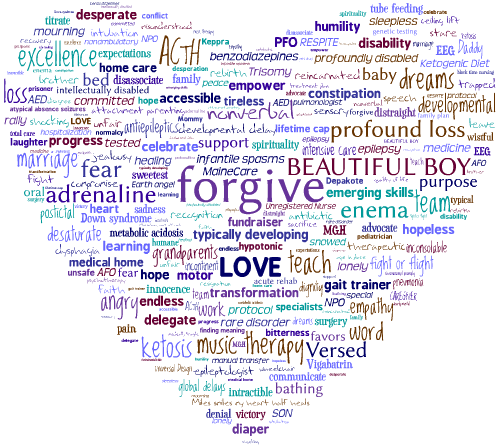Miles Smiles (My Heart Half Heals)
Mothering a severely disabled child with love
At the toy store
When Miles was a baby, we had so many struggles beyond just keeping him alive and safe. Even the act of finding our son the perfect gift was rife with heartache.
At the age of three, our medically fragile son got frighteningly ill with a respiratory virus—or, more likely, two concurrent viruses. After days of fighting to keep him breathing on his own, he had to be intubated. He was in the pediatric intensive-care unit for seven weeks, and we lived with him there, in the hospital in Boston. We took it day by day, not knowing how things would turn out.
Miles’ dad and I started to go home on weekends, for respite together, despite our guilt. At first, it felt wrong to leave our gravely sick baby’s hospital bedside. Reassured by the outstanding one-to-one nursing care that he was getting, and cagey and exhausted and dreaming of home, we needed a break whenever possible. So we starting driving home on most Saturdays to clear our heads, walk on the beach together, relax in our own home, and try to conjure positive thoughts.
Home was comfortable and nice, but it was empty without our Miles.
One of those weekends heading back to the hospital from Maine, we stopped into a toy store. Our love for Miles felt helpless and restless. We needed to do something for him.
The toy store was a loaded choice. Almost everything in their aisles was a stabby reminder of all the things our child could not do or enjoy. Previous visits there at Christmastime had us both in tears, desperately looking for something, anything, appropriate and meaningful to give our one beautiful baby. But on that day, while he was hooked up to a breathing machine back in Boston, we went into the big chain toy store on our way back to him. We wanted to try to find a little something to give Miles when words and emotions were too much.
Stuffed animals were the only safe haven for us. Miles already owned a bunch of them, and their sweet faces didn’t judge or disappoint. We headed to that section of the store.
I searched intently for a stuffie with plush fur for little Miles to touch, and bright colors that would stimulate him. I wanted to find him a soft friend that would bring him even a bit of happiness and magic.
Rounding a corner, a collection of lanky stuffed monkeys huddled on a display endcap. Each had fur in a different pair of bright colors. Each one had laughingly long arms and legs, with velcro on its palms and soles so that its limbs could wrap around something, or somebody, and its paws and feet could attach. Each monkey also had a fun word like “Silly” embroidered on its belly.
I looked over the monkey tribe. They were very cute, but a little too happy for us right now.
Then I gasped at one particular guy in the bunch. He was turquoise with purple markings, two of my favorite colors. His mouth was a wavy line, and looked friendly but determined. He was cute like the rest, but his tummy word was serious. It said “Brave.”
I walked straight to the register and purchased that heaven-sent stuffie. We took him to back to Miles in his triage area as our offertory. Our little boy’s eyes were still closed, but I knew he approved of the gift. I wanted that brave monkey to lean over, open his stoic mouth, and tell us that everything was going to be OK.
In the PICU, they were still forcing a coma on Miles with heavy meds. He was still hooked up to so many tubes that it was difficult to even hold him. Taking turns doing so was our daily commitment and reward.
We hung his new stuffed monkey from the headboard of his hospital bed. Every day we moved it around Miles’ bed, trying to rekindle our sense of humor. We hung new photos of a healthier Miles, fixed his pillow nest, and rubbed his unmoving legs. Brave Monkey was the centerpiece of our shrine for our son, as we waited to see if he would recover.
We held vigil there, in that solemn place where doctors defy death every day. Stephen conveniently walked to his job just up the street on weekdays. I attended the daily medical rounds each morning, making every other waking activity secondary because I never knew exactly when the team would appear at Miles’ bed.
I also helped the nurses wash and groom my sleeping son in his hospital bed on the days when I wasn’t too depressed. I ate mediocre cafeteria breakfasts and lunches on a tray sitting next to Miles until I had to get outside to clear my head from toxic levels of the floor’s parental pain. There were dead-eyed parents among us who didn’t know how to leave their vegetative children for a little sunshine and fresh air. I understood them now, and I worried deeply for them.
Miles’ makeshift hospital-bed shrine reminded me of our lives at home. As hard as that life had become, I desperately wanted it back. I wanted three of us together at our beach, to fight illness and disability on our own. I wanted to sleep poorly in our own bed with the monitor on Miles in his own crib in the bedroom below us. I wanted to fret and pace and weep in private, inside our own four walls.
In the intensive care unit, we were cradled through each long day by nurses who could not have provided better or more loving clinical care and dignity for our son. They shooed us away on Saturday mornings, and put our spirits totally at ease to leave our baby with them. We would return from home on Sunday afternoons to more homemade decorations on his bed: a photo collage of our Miles Julian strung to his side rail one week, a life-affirming poster crowned by the tracings of his beautiful little hands.
Some weeks later, after a failed first attempt, Miles’ doctors tried once again to extubate him. With utmost caution, his coma-inducing meds were peeled off and the settings on his ventilator were dialed down. We watched and waited to see if his body would allow us to remove his life-saving breathing tube. The balancing act that these elite physicians had to perform to keep Miles safe and alive was shockingly difficult.
With both terror and joy, we watched our son being born once again, this time entirely outside of my body, as he breathed on his own for the first time in months. Being a sick baby was so goddamned unfair. Being a mother and all the possible outcomes that that presented was so much more fraught than I ever imagined. I was split open every day.
We held our slowly awakening child in our arms, buoyed by daydreams of going home with him.
Days later, he was able to go to the pediatric floor, and then finally discharged. Instead of heading home, we found the gumption to do what was best for Miles and say yes to five weeks of acute rehabilitation facility. He was phenomenally weak. We would transfer him straight there. Ironically, we were heading to Brighton, a borough of Boston where Stephen and I had both lived separately and then together in our first apartment when we got married.
We brought our suitcases in Miles’ new hospital room, and I set up his stuffed animals for him. The nurses there were good, but we had to share them now with other patients and resume more of his care ourselves.
Any little comforts, like a hot shower or wearing my slippers from home, helped get me through the long days. Stephen took the subway to work and I was at Miles’ side for every tedious physical therapy, occupational therapy, and speech therapy session that they scheduled for him. He had four to six therapy sessions daily. If Baby Miles could do little previously, he could do even less than a little now, after being bedridden for so long. His therapists were sunny and devoted, cheering him on and celebrating each of his tiny victories. Believe me, they were infinitesimal by typical standards. I cheered the loudest, and cried with pride to see him on his tummy, his little diapered bottom propped up by the PT in the air, and staying there, as he snoozed.
At night, Stephen and I ventured out in our former neighborhood, walking to our favorite haunts for dinner and cocktails when we were confident about the nurse on-duty for Miles. We ate our favorite Mexican cuisine and silently toasted our son’s survival with big margaritas. We were dazed to be forced back to our old stomping grounds in a way that we didn’t want or enjoy, under such unimaginable circumstances.
Whether or not it was actually true, I told Miles and myself every day that he was being very brave with all the hard physical work he was being forced to do in his therapies. The weeks went on and we met other children at the facility. Some had lived there for years. A few had sharp minds trapped inside gnarled small bodies. One orphaned boy in particular loved Stephen’s nightly guitar playing, and wanted to break out and find his forever family. Some days we could not stand the pain that we saw, on top of our own for our child.
Whatever we had learned the night before about our young floormates, Miles’ monkey gave us his steadfast praise every day from the hospital bed, where he hung from the cold metal bars with clasped paws.
At long last came the day when Miles was finally discharged from rehab, and no one was asking us to do anything else for his benefit but to go home. We had lived in hospital rooms for three months. Stephen and I packed up our still-weak baby and his furry menagerie, and headed back to Maine. I kissed our pumpkin-pine floors when we walked through our beloved door.
***
A year or so later, after more illnesses, ambulance calls, and hospitalizations for Miles, I wanted to find more of those special stuffed monkeys. I’m not exactly sure why. Maybe I thought that some siblings for the first one would bear different inspirational words on their bellies to help get us through the days. Alternately I needed “Hope,” “Devoted,” “Fight,” and the most unlikely (if only for space constraints): “You are doing a great job.”
I jumped on the internet to locate a few for sale. First I tried the original store’s website where we’d bought Brave Monkey. There was no product match. Then I did a general internet search. Still zero product matches came up, despite numerous attempts. I checked Brave Monkey’s product tag and searched again using those words. Still nothing. I couldn’t believe that a mass-produced toy that I needed so badly in quantity could not be found. I couldn’t believe that I needed a toy.
As a last-ditch effort, I visited that local chain toy store alone, even though I knew it was futile. The remaining stuffed monkeys had long been purged from the shelves. I hoped that most of the monkeys went to the homes and hospital rooms of other of sick children, remembering how we had seen firsthand that “home” and “hospital” are sometimes the same place. I also hoped that some went to those who were fully aware in their lives and aching with grief—unlike our innocent son, but more like his parents.
I then fully realized that I had found the very best toy for Miles, and for me, when it mattered. We needed no more of them now. The monkey had in some small way gotten us through the darkness, if only as a welcome distraction, when our son’s lungs had given out and refused for a very long time to work on their own.
The Brave Monkey was snuggling next to little Miles as he napped in his crib, breathing on room air. That was the amazing thing. I left the store and went back to my son, to hold him close in his bedroom without the interference of any wires, because I could.



